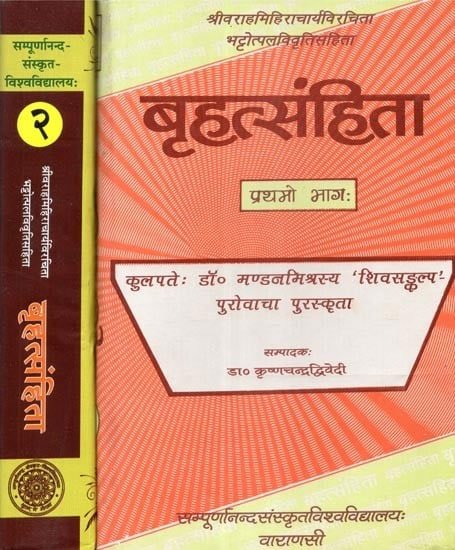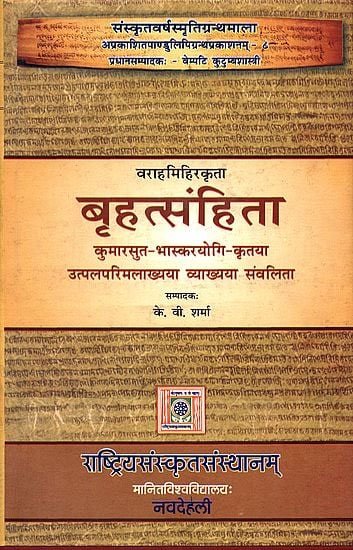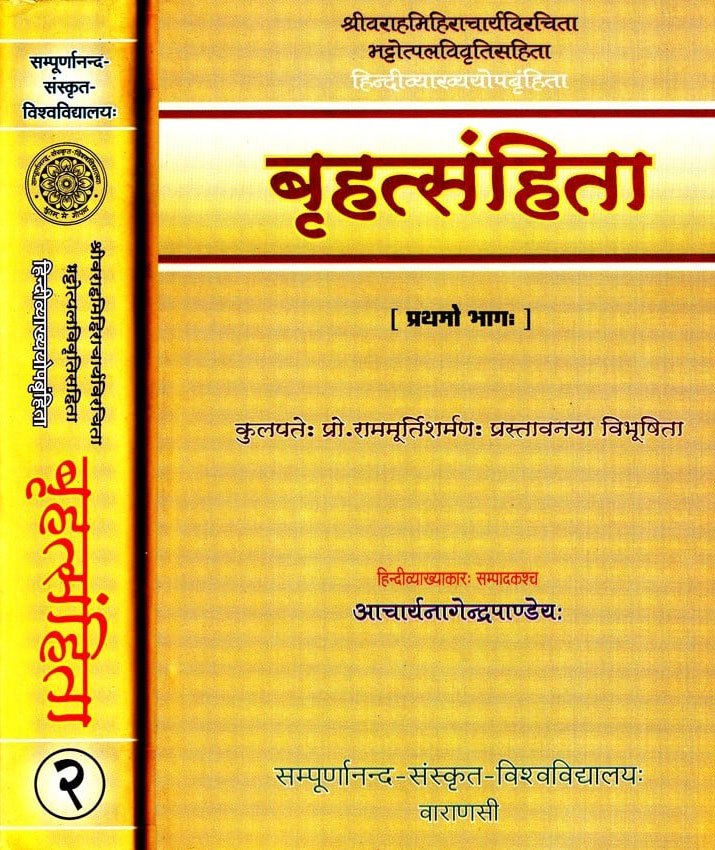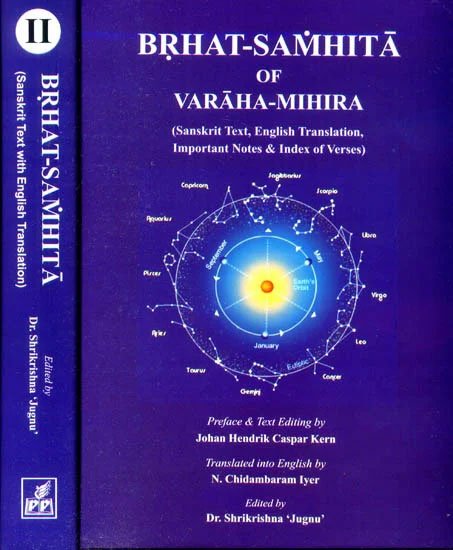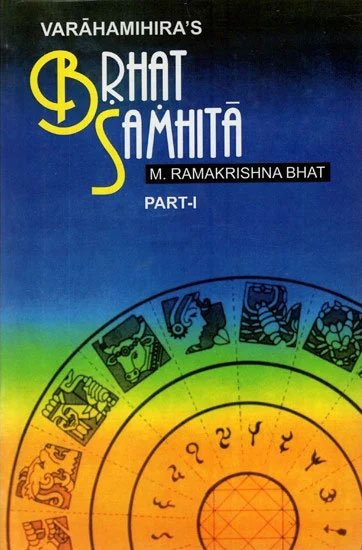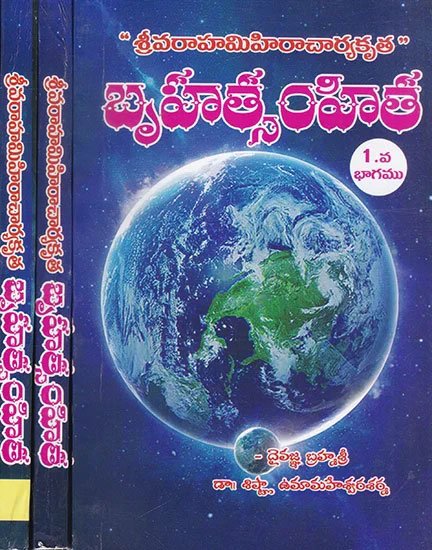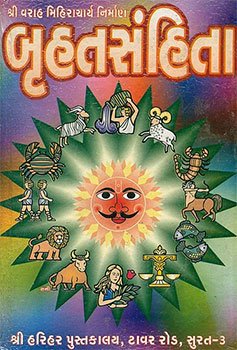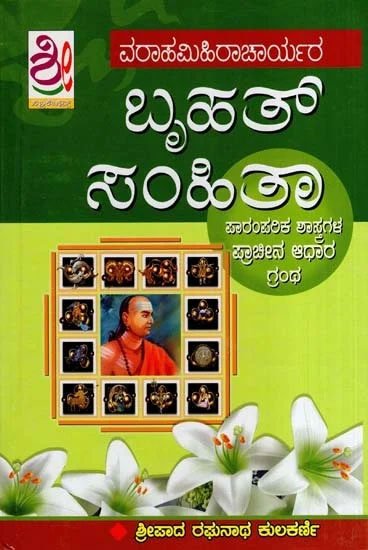Brihat-samhita [sanskrit]
26,560 words
The Sanskrit text of the Brihat-samhita from the 6th-century authored by Varaha Mihira in present-day Ujjain, India. It primarily deals with astrology and astronomy but is presented as an encyclopedia of knowledge.
Verse 68.20
ईषद्दन्तुरकस्तनुद्विजनखः कोशेक्षणः शीघ्रगो विद्याधातुवणिक्क्रियासु निरतः सम्पूर्णगण्डः शठः ।
सेनानीः प्रियमैथुनः परजनस्त्रीसक्तचित्तश्चलः शूरो मातृहितो वनाचलनदीदुर्गेषु सक्तः शशः ॥ २० ॥
īṣaddanturakastanudvijanakhaḥ kośekṣaṇaḥ śīghrago vidyādhātuvaṇikkriyāsu nirataḥ sampūrṇagaṇḍaḥ śaṭhaḥ |
senānīḥ priyamaithunaḥ parajanastrīsaktacittaścalaḥ śūro mātṛhito vanācalanadīdurgeṣu saktaḥ śaśaḥ || 20 ||
The Sanskrit text of Verse 68.20 is contained in the book Brihata Samhita (Sanskrit Text with Hindi Translation) by Pandit Achyutananda Jha. This book is available online or you could buy the latest edition:
Read online Buy now! The Sanskrit text by Pandit Achyutananda Jha (2001)
Glossary of Sanskrit terms
Note: This extracts Sanskrit terms and links to English definitions from the glossary, based on an experimental segmentation of verse (68.20). Some terms could be superfluous while some might not be mentioned. Click on the word to show English definitions.
Ishat, Danturaka, Tanu, Dvija, Nakha, Koshekshana, Shighraga, Vidya, Dhatu, Vanikkriya, Nirata, Sampurna, Ganda, Shatha, Senani, Priyam, Pri, Priya, Parajana, Tri, Sakta, Citta, Cala, Calas, Shura, Hita, Vana, Durga, Shasha,
Analysis of Sanskrit grammar
Note: this is an experimental feature and only shows the first possible analysis of the Sanskrit text (Verse 68.20). If the system was successful in segmenting the sentence, you will see of which words it is made up of, generally consisting of Nouns, Pronouns, Verbs, Participles and Indeclinables. Click on the link to show all possible derivations of the word.
- Line 1: “īṣaddanturakastanudvijanakhaḥ kośekṣaṇaḥ śīghrago vidyādhātuvaṇikkriyāsu nirataḥ sampūrṇagaṇḍaḥ śaṭhaḥ ”
- īṣad -
-
īṣat (indeclinable adverb)[indeclinable adverb]īṣat (noun, masculine)[compound]īṣat (noun, neuter)[nominative single], [vocative single], [accusative single]
- danturakas -
-
danturaka (noun, masculine)[nominative single]
- tanu -
-
tanu (noun, masculine)[compound], [adverb]tanu (noun, neuter)[compound], [adverb], [nominative single], [vocative single], [accusative single]tanū (noun, feminine)[adverb], [vocative single]√tan (verb class 8)[imperative active second single]
- dvija -
-
dvija (noun, masculine)[compound], [vocative single]dvija (noun, neuter)[compound], [vocative single]
- nakhaḥ -
-
nakha (noun, masculine)[nominative single]
- kośekṣaṇaḥ -
-
kośekṣaṇa (noun, masculine)[nominative single]
- śīghrago* -
-
śīghraga (noun, masculine)[nominative single]
- vidyā -
-
vidyā (noun, feminine)[nominative single]
- dhātu -
-
dhātu (noun, feminine)[compound], [adverb]dhātu (noun, masculine)[compound], [adverb]dhātu (noun, neuter)[compound], [adverb], [nominative single], [vocative single], [accusative single]√dhā (verb class 2)[imperative active third single]
- vaṇikkriyāsu -
-
vaṇikkriyā (noun, feminine)[locative plural]
- nirataḥ -
-
nirata (noun, masculine)[nominative single]
- sampūrṇa -
-
sampūrṇa (noun, masculine)[compound], [vocative single]sampūrṇa (noun, neuter)[compound], [vocative single]
- gaṇḍaḥ -
-
gaṇḍa (noun, masculine)[nominative single]
- śaṭhaḥ -
-
śaṭha (noun, masculine)[nominative single]
- Line 2: “senānīḥ priyamaithunaḥ parajanastrīsaktacittaścalaḥ śūro mātṛhito vanācalanadīdurgeṣu saktaḥ śaśaḥ ”
- senānīḥ -
-
senānī (noun, masculine)[nominative single], [vocative single]
- priyam -
-
priyam (indeclinable)[indeclinable]priya (noun, masculine)[adverb], [accusative single]priya (noun, neuter)[adverb], [nominative single], [accusative single]priyā (noun, feminine)[adverb]prī (noun, masculine)[accusative single]prī (noun, feminine)[accusative single]
- ait -
-
√i (verb class 2)[imperfect active third single]
- hunaḥ -
-
hū (noun, neuter)[ablative single], [genitive single]
- parajanas -
-
parajana (noun, masculine)[nominative single]
- trī -
-
tri (noun, masculine)[nominative dual], [vocative dual], [accusative dual]
- sakta -
-
sakta (noun, masculine)[compound], [vocative single]sakta (noun, neuter)[compound], [vocative single]√sag -> sakta (participle, masculine)[vocative single from √sag class 1 verb]√sag -> sakta (participle, neuter)[vocative single from √sag class 1 verb]√saj -> sakta (participle, masculine)[vocative single from √saj class 1 verb]√saj -> sakta (participle, neuter)[vocative single from √saj class 1 verb]√sañj -> sakta (participle, masculine)[vocative single from √sañj class 1 verb]√sañj -> sakta (participle, neuter)[vocative single from √sañj class 1 verb]
- cittaś -
-
citta (noun, masculine)[nominative single]√cit (verb class 2)[present active third dual]
- calaḥ -
-
calas (noun, neuter)[compound], [nominative single], [vocative single], [accusative single]cala (noun, masculine)[nominative single]
- śūro* -
-
śūra (noun, masculine)[nominative single]
- mātṛ -
-
mātṛ (noun, masculine)[compound], [adverb]mātṛ (noun, feminine)[compound], [adverb]
- hito* -
-
hita (noun, masculine)[nominative single]√hi -> hita (participle, masculine)[nominative single from √hi class 5 verb]
- vanā -
-
vana (noun, masculine)[compound], [vocative single]vana (noun, neuter)[compound], [vocative single]vanā (noun, feminine)[nominative single]√van (verb class 1)[imperative active second single]
- acalan -
-
√cal (verb class 1)[imperfect active third plural]
- adī -
-
ad (noun, neuter)[nominative dual], [vocative dual], [accusative dual]
- durgeṣu -
-
durga (noun, masculine)[locative plural]durga (noun, neuter)[locative plural]
- saktaḥ -
-
sakta (noun, masculine)[nominative single]√sag -> sakta (participle, masculine)[nominative single from √sag class 1 verb]√saj -> sakta (participle, masculine)[nominative single from √saj class 1 verb]√sañj -> sakta (participle, masculine)[nominative single from √sañj class 1 verb]
- śaśaḥ -
-
śaśa (noun, masculine)[nominative single]
Other editions:
Also see the following editions of the Sanskrit text or (alternative) English translations of the Verse 68.20
Brhatsamhita with the Commentary of Bhattotpala
by Krishna Chandra Dwivedi (2016)
Publisher: Sampurnanand Sanskrit University; 1229 pages;
Buy now!
Brihat Samhita with the Commentary of Utpalapatimala of Yogisvara
by K. V. Sharma (2012)
Publisher: Rashtriya Sanskrit Sansthan, Janakpuri; 754 pages; ISBN-10; 8186111360; ISBN-13: 9788186111369
Buy now!
Brihat Samhita (Hindi Translation)
by K. V. Sharma (2002)
Publisher: Sampurnanand Sanskrit University; 2359 pages; ISBN-13: 9789387890008.
Buy now!
Brhat Samhita (English translation)
by N. Chidambaram Iyer (2022)
Publisher: Parimal Publication Pvt. Ltd.; 801 pages; Edited by Dr. Shrikrishna Jugnu; ISBN-10: 8171104215; ISBN-13: 9788171104215.
Buy now!
Brhat Samhita (English with notes)
by M. Ramakrishna Bhat (2010)
Publisher: Motilal Banarsidas Publishers Pvt. Ltd.; 1155 pages; ISBN-10: 8120810600; ISBN-13: 9788120810600.
Buy now!
Brhat Samhita (Telugu translation)
by Sishtla Umamaheswara Sharma (2020)
Publisher: Mohan Publications, Andhra Pradesh; 846 pages.
Buy now!Preview of verse 68.20 in Kannada sript:
ಈಷದ್ದನ್ತುರಕಸ್ತನುದ್ವಿಜನಖಃ ಕೋಶೇಕ್ಷಣಃ ಶೀಘ್ರಗೋ ವಿದ್ಯಾಧಾತುವಣಿಕ್ಕ್ರಿಯಾಸು ನಿರತಃ ಸಮ್ಪೂರ್ಣಗಣ್ಡಃ ಶಠಃ ।
ಸೇನಾನೀಃ ಪ್ರಿಯಮೈಥುನಃ ಪರಜನಸ್ತ್ರೀಸಕ್ತಚಿತ್ತಶ್ಚಲಃ ಶೂರೋ ಮಾತೃಹಿತೋ ವನಾಚಲನದೀದುರ್ಗೇಷು ಸಕ್ತಃ ಶಶಃ ॥ ೨೦ ॥
Brhat Samhita (Gujarati translation)
by - (2000)
Publisher: Shree Harihar Pustakalay, Surat; Author: Shri Varahamihira Acharya (શ્રી વરાહમિહીરાચાર્ય); 432 pages.
Buy now!Preview of verse 68.20 in Gujarati sript:
ઈષદ્દન્તુરકસ્તનુદ્વિજનખઃ કોશેક્ષણઃ શીઘ્રગો વિદ્યાધાતુવણિક્ક્રિયાસુ નિરતઃ સમ્પૂર્ણગણ્ડઃ શઠઃ ।
સેનાનીઃ પ્રિયમૈથુનઃ પરજનસ્ત્રીસક્તચિત્તશ્ચલઃ શૂરો માતૃહિતો વનાચલનદીદુર્ગેષુ સક્તઃ શશઃ ॥ ૨૦ ॥
Brhat Samhita (Kannada translation)
by Sripada Raghunatha Kulkarni (2021)
Publisher: Srinidhi Publications, Bangalore; 668 pages with illustrations.
Buy now!Preview of verse 68.20 in Kannada sript:
ಈಷದ್ದನ್ತುರಕಸ್ತನುದ್ವಿಜನಖಃ ಕೋಶೇಕ್ಷಣಃ ಶೀಘ್ರಗೋ ವಿದ್ಯಾಧಾತುವಣಿಕ್ಕ್ರಿಯಾಸು ನಿರತಃ ಸಮ್ಪೂರ್ಣಗಣ್ಡಃ ಶಠಃ ।
ಸೇನಾನೀಃ ಪ್ರಿಯಮೈಥುನಃ ಪರಜನಸ್ತ್ರೀಸಕ್ತಚಿತ್ತಶ್ಚಲಃ ಶೂರೋ ಮಾತೃಹಿತೋ ವನಾಚಲನದೀದುರ್ಗೇಷು ಸಕ್ತಃ ಶಶಃ ॥ ೨೦ ॥
![Brihat-samhita [sanskrit] - book cover](/uploads/a/Brihat-Samhita-Sanskrit.jpg)
